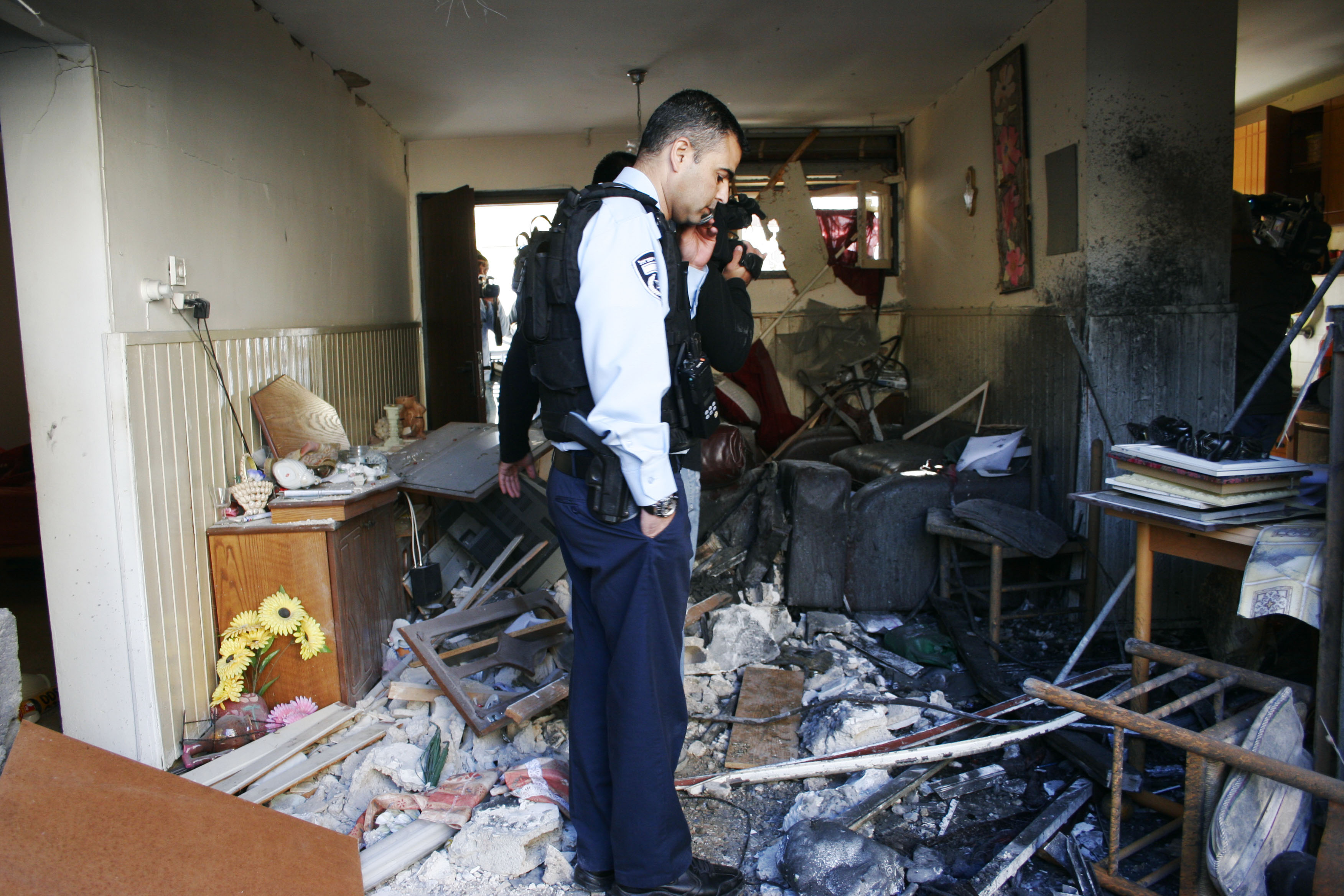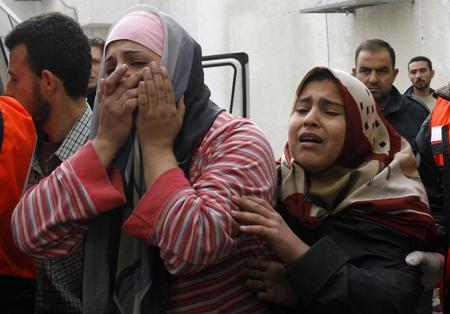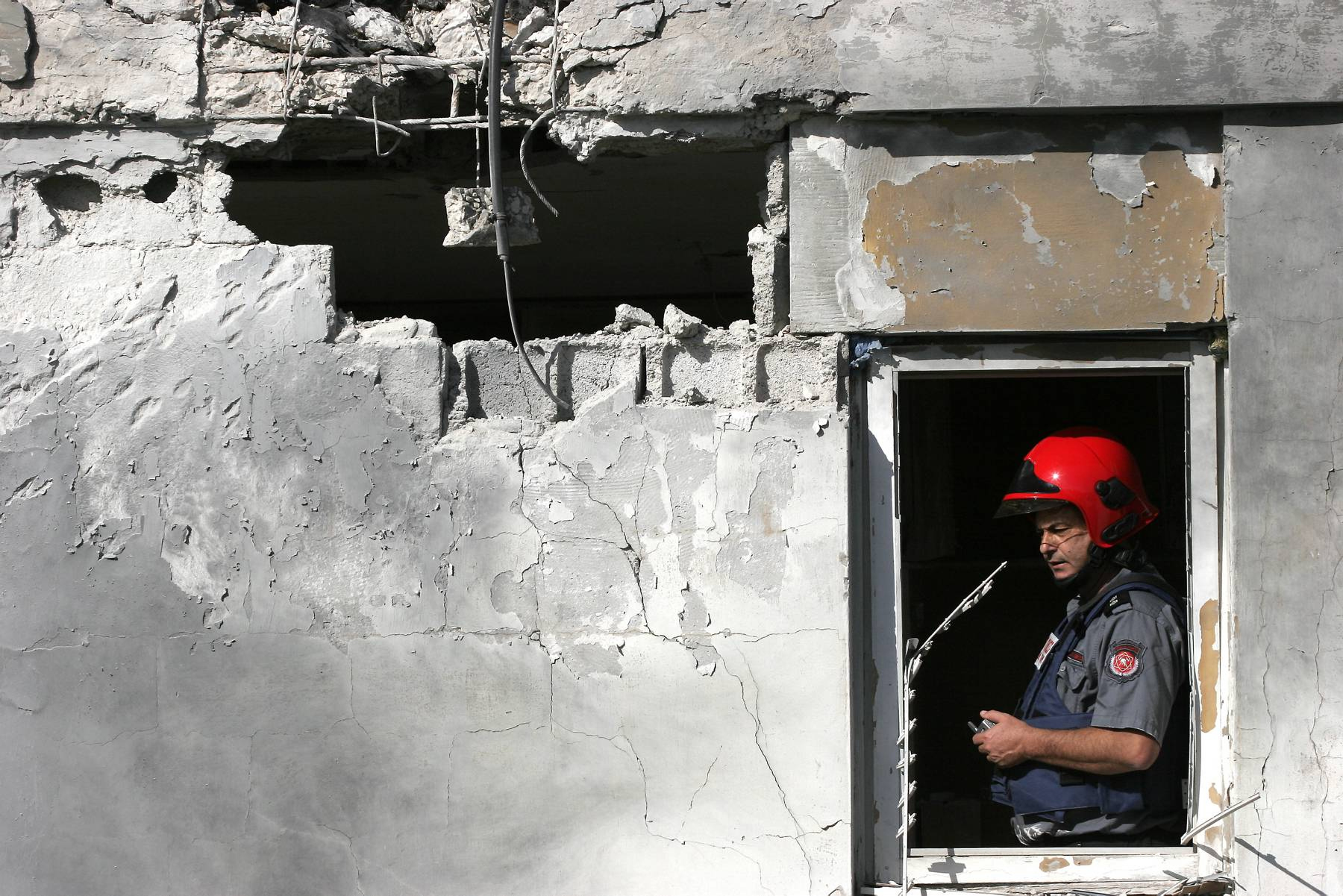In This Episode << SLIDE LEFT TO SEE ADDITIONAL SEGMENTS
Is Gaza a Just War?
COMMENTARY
Rabbi Jack Moline is the rabbi at Agudas Achim Congregation in Alexandria, Virginia:
There is an old joke about a group of tourists taken prisoner by a guerilla group in a distant country. The leader of the gang tells them they will be executed one by one, but they will each be granted a last request. An Israeli member of the group volunteers to go first, and as his last request asks to be kicked in the rear end. The kidnappers are mystified, but after a little back and forth agree to the request and one of them plants a swift boot on the Israeli’s back side. At that point, the Israeli spins around and, with a combination of fists and guns, disables all the guerillas.
 Qassam rocket destroys home of an elderly woman in Sderot. Courtesy of The Israel Project. |
Stunned, the survivors turn to him and one of them asks, “Why did you ask for a kick in the rear before you did that?” The Israeli answered, “Because otherwise the headlines would read ‘Tourists Rescued After Unprovoked Israeli Attack.'”
War is very bad business. No one with an ounce of compassion wants to cause suffering to innocents, heartbreak to parents or terror to civilians. But when those without that ounce of compassion promote suffering, heartbreak or terror, then the only inappropriate response is no response at all.
“Just war” theory is a philosophical term, and I am not a philosopher. This war is a necessary war because all other efforts to end the rain of missiles on undisputed Israeli territory by Hamas operatives from Gaza have been unsuccessful. Those efforts have come from within and without Palestinian quarters, Arab society, the Muslim world and Israel itself. Arguments about proportionality, cycles of violence and broad concepts of justice overlook the unwillingness of Hamas to respond to any appeal or pressure to end the immediate cause of danger to civilians in Israel and in Gaza. Absent from all of the protests about Israeli military action is “proportionate” protest over the past years against the terrorizing of Israeli children and their parents by Hamas. The only reason Israeli civilian casualties are fewer is because Hamas is bad at aiming those missiles, not because they are more compassionate.
I am persuaded that Israel’s military is doing its utmost to minimize casualties among non-combatants. With cynicism and cruelty, Hamas has used human shields and compromised religious and humanitarian institutions to stage its own operations. “Collateral damage” seems part of their plan. And when innocent life is lost, there is no rejoicing in the Israeli press, the Israeli streets or the Israeli military. Israel knows that there are two losses it cannot endure: the loss of this war and the loss of its humanity. The vigorous debates among Israelis and the long-time supporters of Israel about the conduct of this operation are an indication that both priorities are being pursued.
There are larger questions about justice in the region that are relevant to address when a dependable cease-fire takes place. But at the moment, only willful ignorance of the circumstances that provoked Israel’s current operation would lead an individual to question this sovereign government’s responsibility to protect its citizens.
Israel has endured close to 7000 kicks in the back side. Somehow, for some folks, that wasn’t enough.
Kevin Carnahan is Visiting Assistant Professor of Religion at Hendrix College in Conway, Arkansas:
 Family members watch a loved one being taken to hospital after being wounded in the violence. Photo: Fady Adwan, Freelancer Gaza. |
I was in Jerusalem when the current Israeli military action began. As usual, the region was divided not only by the lines of battle, but also by the stories people were telling about the ongoing violence. Even as Israeli public opinion swung in favor of the action to defend their fellow citizens against rockets fired by Palestinian militants, a friend from East Jerusalem challenged me to explain how it could be that Israel might escape international sanction for targeting noncombatants. There are no easy judgments in a time of war, and there is little common ground for moral dialogue in Israel/Palestine.
Still, the current conflict raises important just war questions. In terms of proximate cause, it is clear that Israel was justified in taking military action. There is no moral justification for shooting rockets at civilian centers in a neighboring territory. Doing so invites military response. But there are questions about moral responsibilities in the longer term relationship between Israel and the Gaza Strip. Israel’s withdrawal from Gaza in 2005 allowed it to set aside its responsibilities as an occupying force while maintaining strict limits on Gaza’s borders, and thus its social and economic potential. The fact that the withdrawal was a unilateral action weakened the Fatah party in Gaza. Hamas could now claim that its aggression had succeeded where Fatah’s political efforts had failed. This set the stage for Hamas’s later electoral victory and its success in the ensuing civil-military conflict with Fatah in Gaza. Israel’s reaction to the political rise of Hamas (supported by many Western powers) was to clamp down all the more on the flow of goods and people in and out of Gaza. In the face of worsening humanitarian conditions and a politically hobbled Hamas regime, Israel has maintained that it bears no responsibility for any supposed injustices in the Gaza Strip.
None of this is to suggest that Israel is simply a malign protagonist in the story. Hamas has not withdrawn its constitutional aim of eliminating the state of Israel. Israel is right to attempt to maintain its own security in the face of a de facto authority that has declared itself in a state of war with Israel. Further, Hamas is either unable to prevent rocket fire into Israel, in which case the Gaza Strip is something like a failed state, or Hamas is actively allowing or supporting rocket attacks, in which case it is undertaking unjust forms of aggression. The point to take away is that something like “just cause” is usually more complex in the real world than the designation of a single act. In most cases, like this one, multiple actors share responsibility for the outbreak of a particular conflict.
More serious are concerns about the ends of the current conflict. As often happens in this ongoing small war, it is unclear what constitutes victory for either side, and it is unlikely that the aims of either side are realistically realizable. Given the political climate, is doubtful Hamas could bring the firing of rockets to a complete halt (even Israel was not able to stop rockets or prevent smuggling when it occupied the Gaza Strip prior to disengagement in 2005), and there is little political incentive for Hamas to participate in a sustained peace agreement so long as it is sidelined from real political power by Israeli and international pressure. It is doubtful Israel is willing to allow Hamas the place at the political table that would be necessary to see to what extent they could rein in other militant movements in the Gaza Strip. Another option for ending rocket fire would be a sustained reoccupation of Gaza by Israeli forces. This, however, is unlikely to be something for which either the Israeli or the Palestinian populace has a stomach.
So what is Israel’s end game? It is hard to know. Domestic and international political contingencies, however, may have played more of a role than the particular situation on the ground. In the light of an impending election, it seems likely that the need to appear tough on national security may have been a factor in the decision-making process for the incumbent coalition (which is likely soon to be out of power). There may also have been a wish to push for the conflict and resolution prior to the new American presidential administration, which is widely perceived as less friendly to Israel’s cause. Such concerns are hard to fit into the boxes of the just war criteria, but who can doubt that they play a significant role in the process of real-time statecraft?
My Arab friend in East Jerusalem raised the question of noncombatant immunity, which is a perennial concern of just war theorists with a deontological bent. Certainly, Israel’s attempts to provide telephone calls alerting the residents of buildings suspected of housing weapons caches of impending strikes is a positive sign of its will to avoid noncombatants. But Israeli actions have not been unquestionably just in this regard. One of Israel’s first targets in the conflict was a police graduation in Gaza. Not only does this target raise questions about the appropriate effort to avoid collateral damage, it also raises questions about the very definition of combat in an irregular situation like the Gaza Strip. Is the police force of Gaza a proper military target? Doubtless many police members saw themselves not as functionaries of Hamas but as common civil servants attempting to maintain a relatively orderly society in unfortunate circumstances. Does reticence in preventing militant groups from firing rockets into Israel render the entire police force of Gaza a viable military target? If the police force is not a viable target, what does constitute a viable military target? Situations like Gaza remind us that even the most ethical of criteria depend on prudence in application and are thus imperfect at best.
More questions should be asked about the proportionality of Israel’s current military actions. In a simple tally of lives, there is no proportionality to be found here. Rockets from the Gaza Strip, though backed with lethal intent, are vaguely aimed and rarely bring about casualties. Israel’s military force is unparalleled in the region and has brought about more destruction in a number of days than rockets fired at the rates prior to the incursion would in years. As such, one should wonder if a set of targeted reprisals would have been more suitable to the task at hand. Still, proportionality is measured not only retrospectively but also in terms of future possibilities. Here again there is the problem of determining what the end game might look like for Israel. No matter what it might be, I have problems justifying the destruction thus far.
In this conflict, absolute statements are rarely of much use for purposes other than inflaming further conflict and obscuring muddy realities on the ground. There is all too much blame to go around and all too little realism about one’s own relative injustices and the relative justice of the opponent. In the midst of this, one thing is clear. It is time for the United States again to take an active interest in the Israeli/Palestinian conflict and to attempt to overcome the oversimplifications that have reigned in its absence. In the meantime, I will pray for my friends in Jerusalem.
Paula Cooey is the Margaret W. Harmon Professor of Christian Theology and Culture at Macalester College in St. Paul, Minnesota:
 Grad Missile Attack on Ashkelon in the South of Israel. Edi Israel photography. |
One of the difficulties with just war theory is that the criteria are subject to interpretation and vary depending on circumstances. So, for example, some ethicists recently argued that the doctrine of preemptive strike fell within the criteria governing just war; likewise the definition of “terrorism.”
Ethicists have also argued that intentions distinguish the violence done to civilian life such that collateral damage, while inevitable and regrettable, does not fall under the category of terrorism, unlike killing civilians with bombs strapped to their bodies. Taken together and coupled with the argument of self-defense, the criterion of preemptive strike and the definition of terrorism justify Israel’s response to Hamas in Gaza. By contrast, those ethicists of the 1970s and 1980s who theorized “just revolution” in South and Central America based on just war theory would arguably defend the actions of Hamas.
Either way, civilians suffer the primary burden of death and wounding, not to mention displacement, terrifying fear, and all the other exigencies of destabilization wrought by the continued violence. Why are we not theorizing an ethical advocacy for civilians? What has happened to the criteria of minimizing civilian contact, proportionality, and the rejection of total annihilation of material resources, central to just war theory (some of which trace their origins to Torah and to the rules governing jihad developed by medieval Muslim jurists)? What has happened to the UN Declaration of Human Rights and the Geneva Accords?
Instead of trying to figure out whether Gaza is just, we need to put more effort into stopping the violence in a lasting fashion.
Anthony F. Lang Jr. is Senior Lecturer at the School of International Relations, University of St Andrews:
 Photo: Palestinian Red Crescent Society |
The just war tradition is not a checklist that can give policy makers a “justification” for what they can and cannot do in certain situations. Rather, it is a set of categories that can provide a framework for public debate on the use of military force. The three key elements of the tradition as they relate to Gaza are just cause, authority, and proportionality. Others may be relevant for some, but these strike me as key.
Authority: The authority of both Israel and Hamas deserves critical scrutiny in this conflict. Importantly, authority can be understood in different ways, both internally and externally. Israel’s actions suggest its leaders understand their authority in two ways: First, they are being attacked and have an authority in relation to the citizens of Israel. Second, and not stated but implied by their actions, they are acting as the authority within the Gaza Strip by seeking to coerce the population as a whole. In terms of the latter form of authority, Israel is not justified to act in the way they have. It is a sovereign state, which would seem to give it an obvious authority. But the people of Gaza contest their sovereignty, and Israel officially renounced its claims on Gaza some time back. Moreover, the Israeli Ministry of Foreign Affairs website states clearly that the Israelis do not want to govern Palestinians.
The just war tradition, however, does give a community the responsibility to protect its own citizens from attack. This authority Israel clearly does have, for they have been subject to rocket attacks by Hamas. Such authority would justify a response that takes out the rocket sites and those manning them, but not a full-scale response designed to destroy the economy and polity. This means the use of “coercive diplomacy” to force the larger Palestinian population in the territory to turn on Hamas is unjust as a tactic. In other words, the Israeli authority to respond with military force to Hamas does exist, but the Israelis overextended it by effectively coercing a whole population.
The authority of Hamas must also be subject to criticism. While they may have been elected, their behavior does not correspond to a just authority, either in the way they treat their own population (using them as shields, hiding from Israeli power in Damascus) or in their failure to act as a responsible member of the international community. This undermines their claims to govern the Palestinians. As I note below, if the authority of Hamas is not just, then their claim to be representing the just cause of the Palestinian people as a whole should be called into question.
Both Israel and Hamas have abused their authority. Any outcome of this conflict must address the underlying status of the Palestinian territories and the Israeli settlements on those territories. This problem cannot be resolved with just a ceasefire. It needs a final decision about who has the proper authority in what areas. In fact, it needs to be resolved on two levels—the internal Palestinian situation and the relationship between Palestine and Israel as two sovereign communities.
Just Cause: In the long term, this situation results from Israel’s unjust treatment of the Palestinians. Since the founding of the state of Israel in 1948, the predominant view among Israeli public and political opinion (with limited, albeit vigorous examples of dissent among Israelis) has been that the Palestinians do not “deserve” the land as much as the Israelis do. This is manifestly unjust. No matter what the religious claims of the Israelis are to the land, they do not justify their treatment of a population that had been resident there. The West Bank and Gaza Strip should be considered “occupied territories,” illegally occupied in my view. The overall cause of resisting Israeli oppression seems to rest with the Palestinian people.
Yet the Palestinian people are not represented by Hamas, and the short-term responsibility of this particular outbreak falls squarely on them. In other words, Hamas does not have a just cause (although the Palestinian people may). Their refusal to deal with the Israelis honestly and openly, their anti-Semitic rhetoric, and their use of short-range missiles to terrorize Israeli citizens demanded a military response. This may appear to contradict the first just cause point, but I don’t think it does. There may be a justified Palestinian anger at the Israelis, but the Palestinians have been dealing with the Israelis for the last 20 years, so for one group—Hamas—to disrupt those relations has caused a huge problem for both sides.
This point reinforces the overall thrust of the just war tradition—that just cause cannot be understood outside of just authority. There may be a just cause, but if an unjust authority takes it up, this vitiates the justice of the action. The Palestinians may have a just cause in resisting Israeli occupation, but the fact that Hamas took up this issue undercuts its justice. The larger just cause may rest with the Palestinians, but the immediate just cause my rest with the Israelis.
Proportionality: The Israeli economic and military response has been profoundly disproportionate on three levels. Their initial economic blockade of the Gaza Strip, which is run by Hamas, has created huge economic hardships. Economic sanctions, as we saw in Iraq, punish entire communities. Perhaps in some cases entire communities deserve punishment, but this seems rare, and I cannot imagine one, so this first step was disproportionate.
Second, the air campaign, by the very nature of such campaigns, has been indiscriminate. While modern air forces claim they have become capable of increasing precision in targeting, and while the Israeli Air Force has been impressive in some cases, strikes from the air will remain indiscriminate when targeting heavily populated areas.
Third, the ground campaign had the potential to be more discriminating than the air campaign. This is because when soldiers confront actual people they can sometimes make judgments based on morality and law. Unfortunately, perhaps as a result of Israeli public discourse about Hamas and the Palestinians, some of that moral sensibility has been undermined. As a result, the Israeli ground campaign has been less discriminate than it could be, but more discriminate than the air campaign.
A further point to keep in mind is that both sides are defining the category of “civilian” differently. For Israelis, any young man who wears the green of Hamas is a “terrorist” and thus a legitimate target. For the Palestinians, most of those young men are just young men. It is difficult to judge this, however, because the definition of civilians who are resisting an occupation is complicated, both in morality and law. Overall, I would say the Israelis are abusing the term “terrorist,” while the Palestinians are abusing the term “civilian.”
Proportionality is not simply an added point that rests under the authority and cause issues. While Israel may have had a short-term just cause, their disproportionate response has undermined the justness of their response.
It is important to commend those trying to resolve the crisis, including the Egyptians, French, and UN officials. Of these, I find the response of the Egyptians to be the most impressive. Egypt is the only Arab government that has any real respect in Israel, and it borders Gaza. Its tradition of using diplomacy to resolve conflicts in the past 30 years has clearly been evident here. This is not to say Egypt is an ideal state, especially internally, and it may have ulterior motives, but that does not undermine its efforts, which the international community should applaud.
As far as short-term immediate responses, Israel needs to lift the entire blockade of Gaza, and Hamas needs to commit to ending its rocket attacks. These are the two primary issues. After this, Israel needs to remove all its settlements from both the Gaza Strip and West Bank. Next, Palestine needs to be declared an official state, by all parties, with a single government and with some contiguity between the territories. These points have already been largely agreed upon, so they are not really long-term impossibilities. Both sides need to stick to their agreements and stop violating the accords.
A long-term ideal solution would be twofold: Jerusalem needs to be no one’s capital but an international city. This condition is highly unlikely, but it is my firm view of what is best. Second, the only real solution would be a single state in which all religious and ethnic groups can live together under a democracy. This is highly unlikely, but it is what I would hope for.
What can the US do? First, it needs to stop supporting Israel so uncritically in the UN and other public forums. Second, while it has already cut back its funding to Israel, it needs to use the funds it does give to pressure Israel into adopting the tactics suggested above. Third, the US needs to pressure the two main Palestinian parties to agree on a single democratic regime, again using its power of the purse. I don’t think US military troops should be involved at all in the region, although perhaps as part of a UN ceasefire force they may be of some help.






